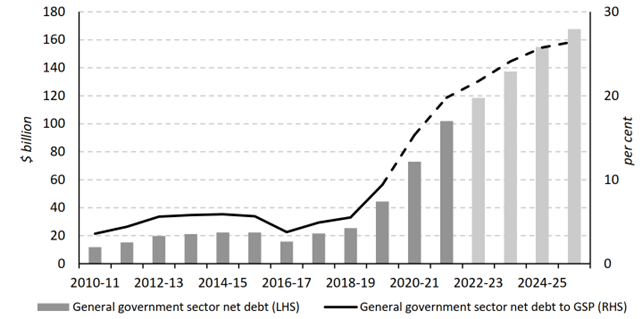By guest contributor Ken Atchison
Extravagant spending has been the primary response from the Victorian Government whenever any issue reflecting on popularity has emerged. Having been re-elected in 2022, the ALP government has decided that the whole of Australia should finance its extravagant spending commitments. Accountability is not an attribute applied by the Victorian Government to actions it has taken. It is constantly adding to the debt burden on future generations.
Focus groups have been driving the decisions by Victoria’s Labor Government. Spending other people’s money is the mindset and all this spending in Victoria requires funding by increased debt. However, focus groups must also be indicating that debt has emerged as a concern in the electorate.
Having committed to the Commonwealth Games, the Victorian Government now believes the rest of the Australia should pay for this extravagance. With spending at a federal level already rising, it is unlikely the Commonwealth will bail out Victoria.
Victorian Government debt has grown at an extraordinary rate over the period since election of the ALP to government. This is shown in Chart 1, from the 2022/23 budget papers. Subsequent election promises have materially increased the projected deficit.
Chart 1: Projected Victorian Net Debt 2015 – 2025

S&P Global project Victorian gross debt in 2026 at $220 billion. This represents debt per person of $34,000, which is an increase of nearly $30,000 per person from $4,150 in 2015 when this government was elected.
There is no evidence of any policy for servicing the increasing Victorian debt. This is particularly concerning as interest rates rise. Interest cost will rise to $7.4 billion in 2025/26 or 8% of total state revenue. What is worse, Victoria’s government is borrowing to pay interest, a fundamentally-flawed financial strategy.
Moody’s conclude that Victoria, uniquely in Australia, has a negative outlook and the issues associated with Victoria’s poor position means future living standards have been put at risk.
There is no recognition of the decline in living standards for all Victorians which is occurring from excessive debt. Declines in public services including health, education, transport and emergency services will occur. Increased taxes and charges are already occurring. There have been 43 new or increased taxes. Land tax has increased over 200%.
Two significant infrastructure projects which were being jointly funded by the Victorian and Federal governments will not proceed. They are the airport rail link and the Geelong fast rail. No doubt the previous federal government will be blamed for this outcome.
Cancellation of more infrastructure projects will occur. Asset sales proceeds will be used to reduce debt rather than capital recycling. Privatisation of existing infrastructure projects will be required.
Stress through higher taxes and charges in the property sector is significant. Persistent business failure is occurring with a resultant loss of employment. (When Porter Davis failed the Victorian Government announced a $15 million package for customers which will be funded by even more debt.) Excess wages in the construction sector from the government infrastructure spending has imposed further cost pressures through wages in the property sector.
Traditional scrutiny of spending through cabinet and parliamentary sittings and business cases has been avoided. The Victorian Premier stated that accountability measures such as parliamentary scrutiny are not important. Disclosure of financial analysis of spending is not available, suggesting that it is not performed. Independent scrutiny of the 2022 ALP election promises by the Parliamentary Budget Office was bypassed. Financial accountability for WorkSafe Victoria is absent as it continues operating under financial stress.
Irresponsible financial management by the Victorian government through excessive debt does matter. Government deficits result from excessive spending today for the benefit of individuals today but responsibility for payment falls on future generations. Reduction in public sector employment will occur with layoffs mooted. A decline in living standards of Victorians will result.
Others will be accused of this failure. Victoria is in danger of becoming a “command economy” and, unfortunately, one in which political power increasingly cannot be challenged.

